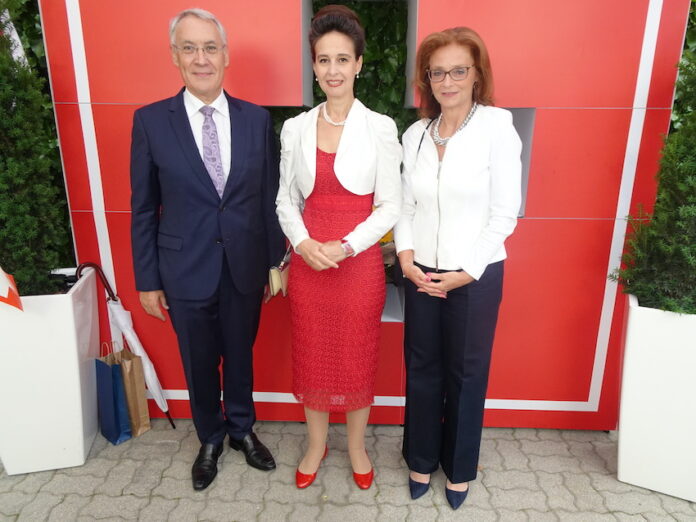“A central recipe of Switzerland’s economic success is the fact that it is an open economy and an open society.”
Edited by Anna Popper
The Swiss National Day is observed annually on 1st August, referring to a historic alliance between three cantons of Uri, Unterwalden and Schwyz (from which the name of the Alpine country originates) that took place in 1291.
According to a legend, a group of freedom-loving men gathered on the Rütli meadow (or Grütli) on the shore of Lake Lucerne in the canton of Uri and swore an oath of allegiance. This pact of alliance has a highly symbolic value, as it is regarded as the foundation of the Swiss Confederation.

On the occasion of the Swiss National Day H.E. Jean-François Paroz, Ambassador of Switzerland to Hungary and his spouse Dr. Yulia Gusynina Paroz hosted a grand reception in the Residence Garden, which was beautifully decorated with red flags featuring the iconic Federal Cross in the centre.

Red and White Photos in the iconic Swiss colours:
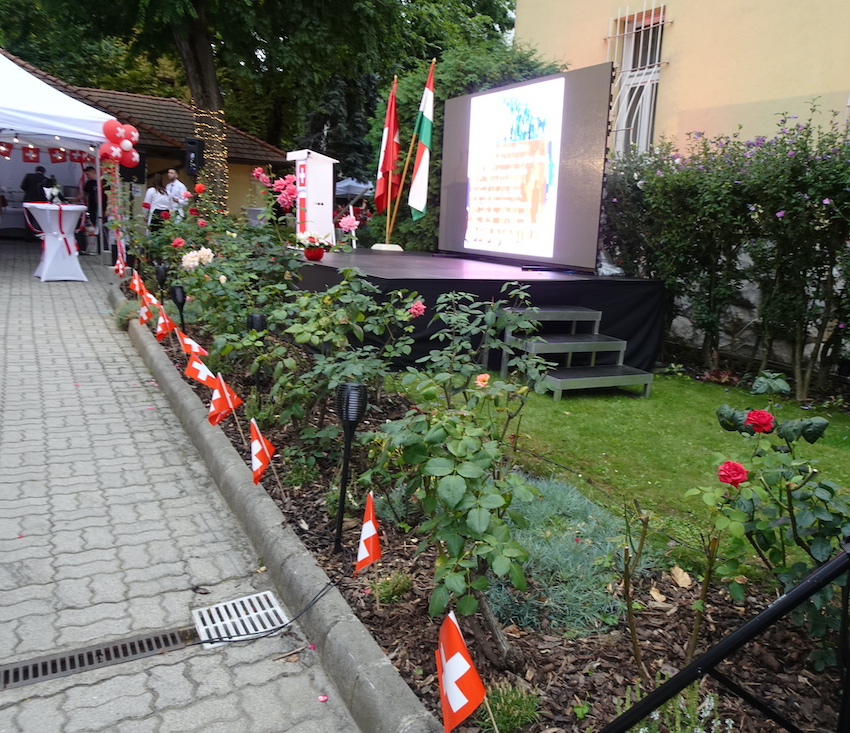
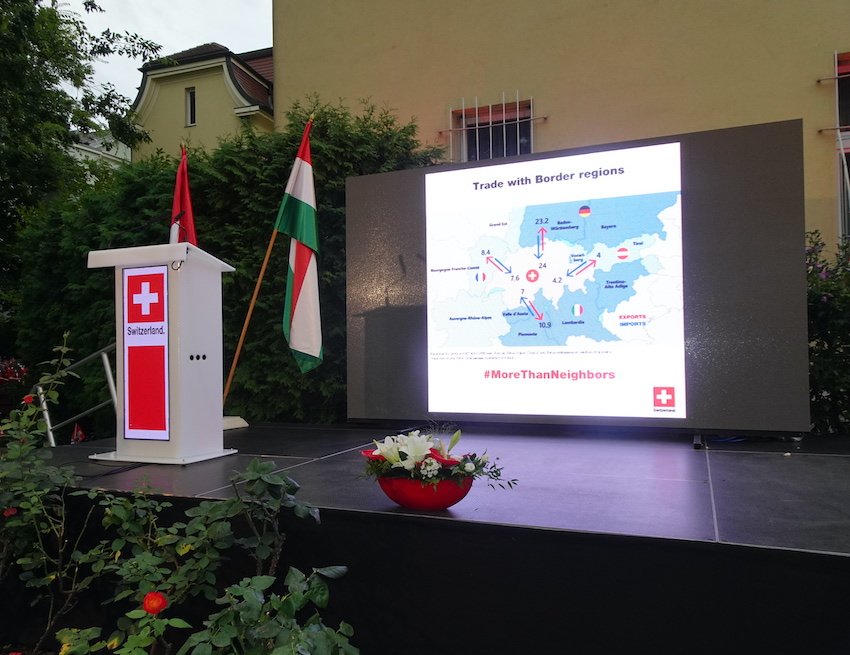
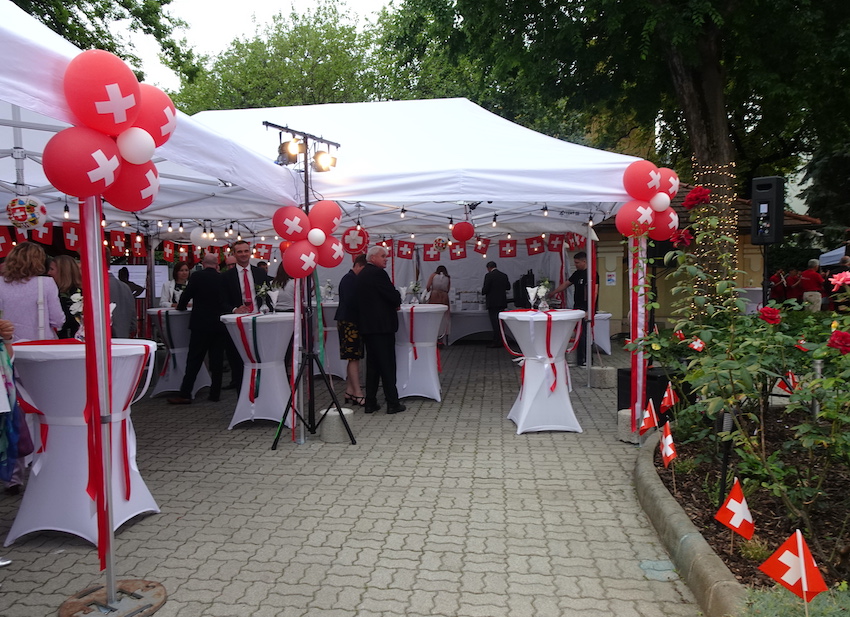


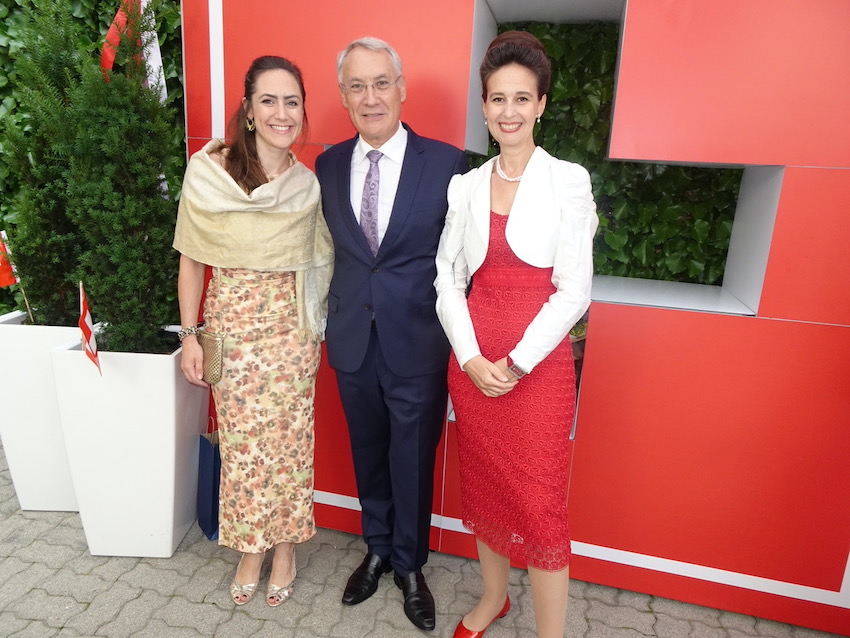



The event was attended by hundreds of distinguished individuals from the Hungarian society, including figures in business, cultural and academic circles, as well as members of the diplomatic corps, the Swiss community in Hungary and friends of Switzerland. This is a time of celebration, reflection and pride for the Swiss people as they remember their historical roots and the values of freedom and independence that the Swiss Confederation represents, and which are part of the national identity.
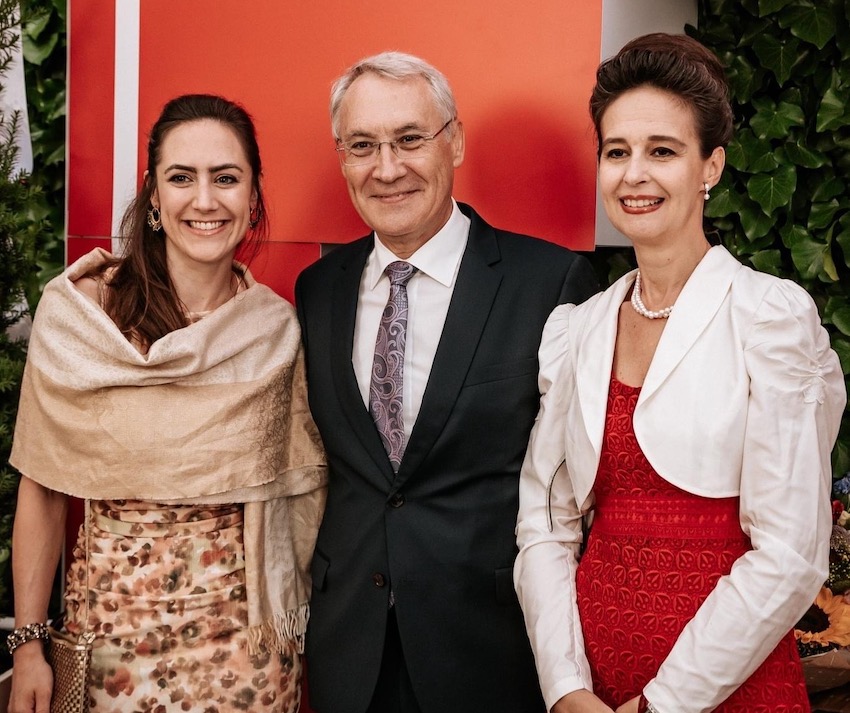
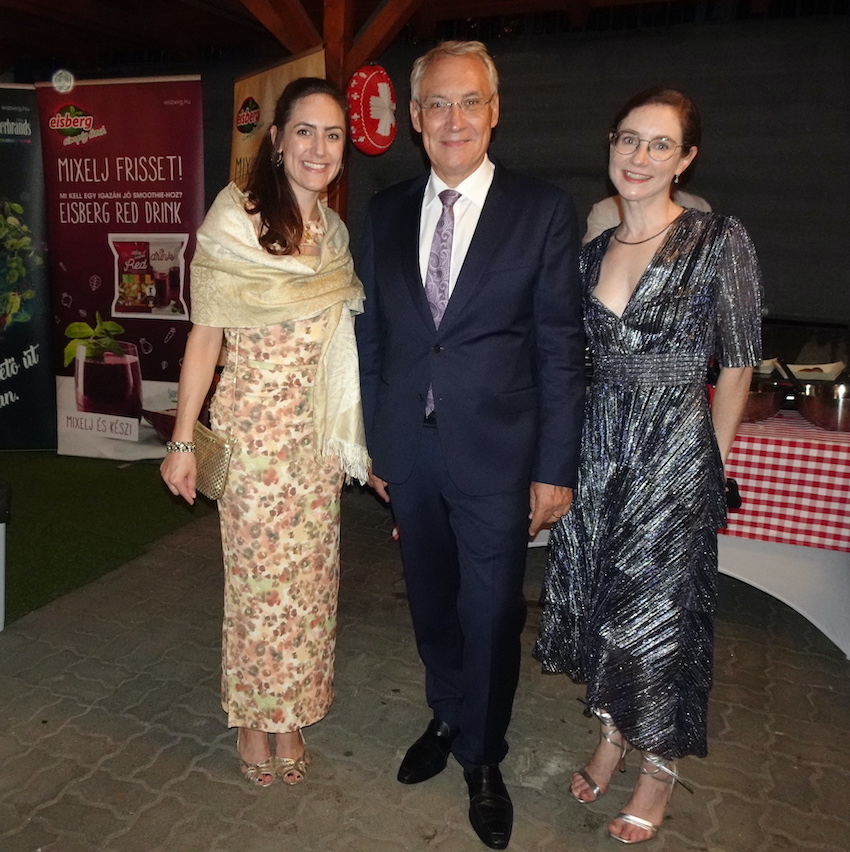
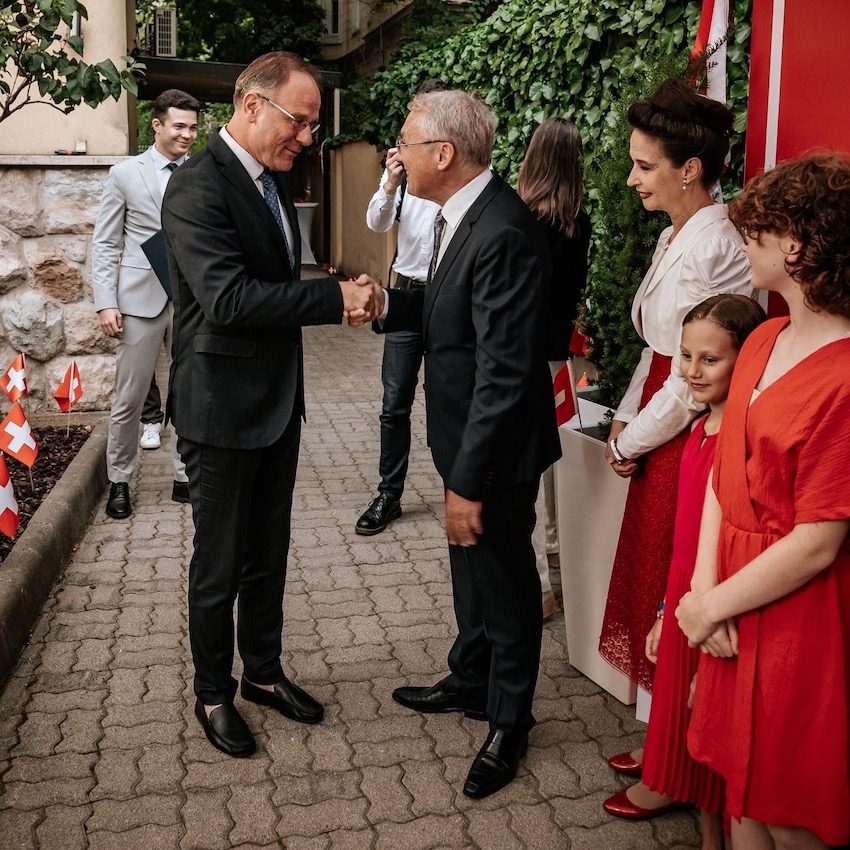
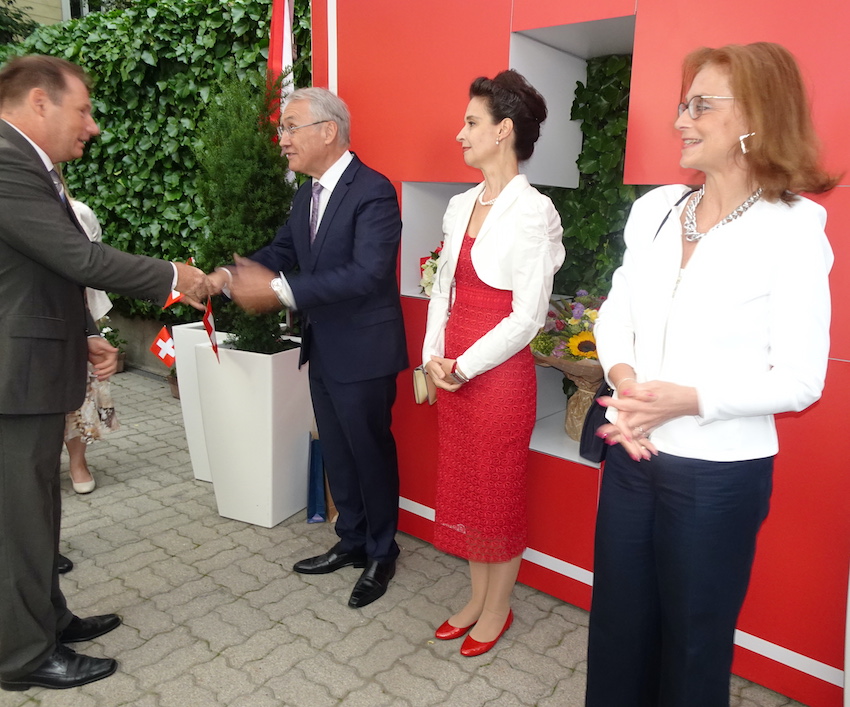
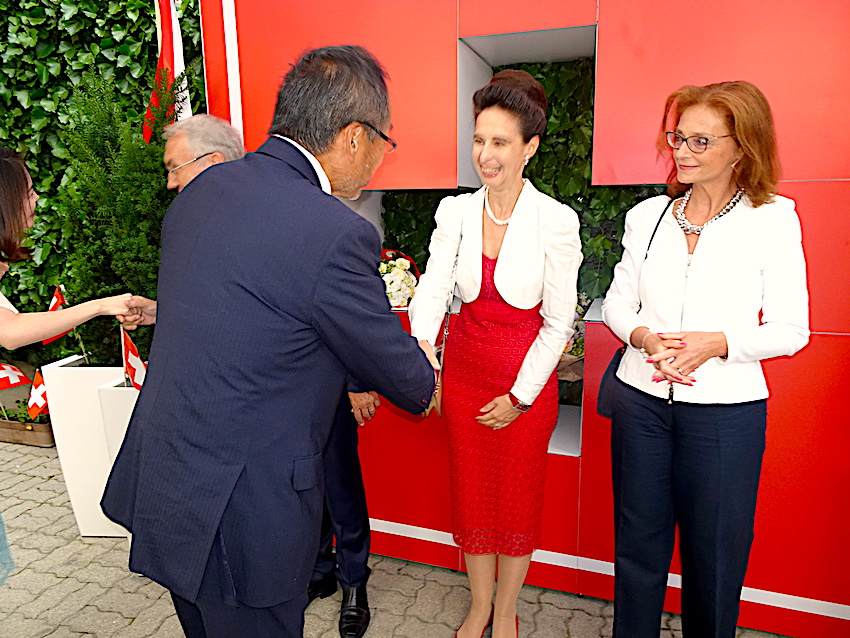



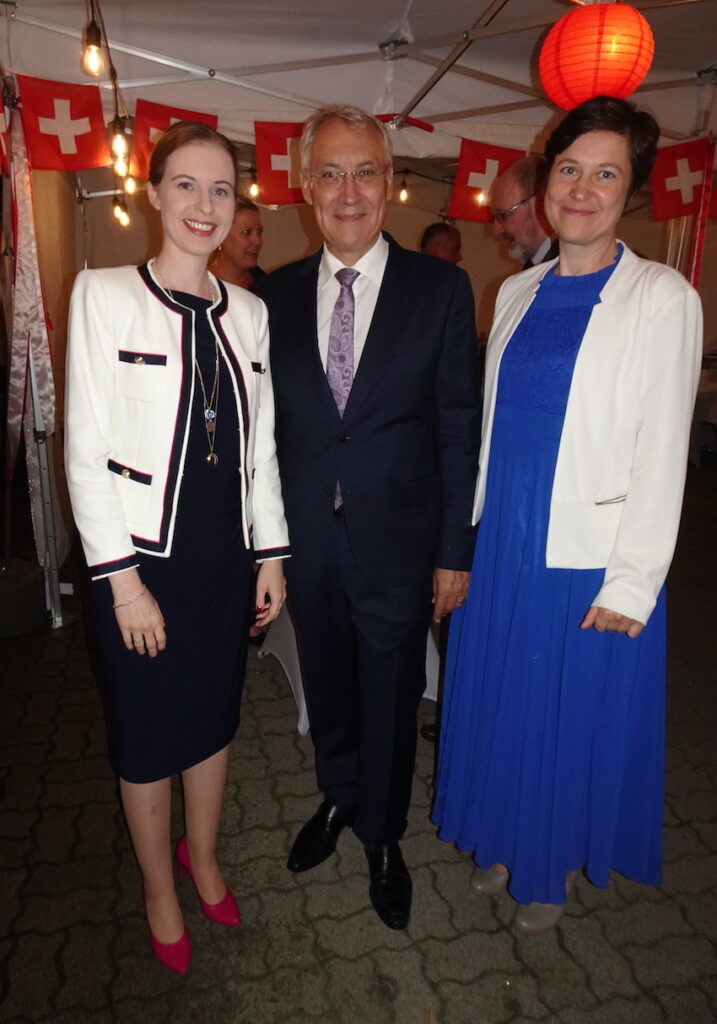
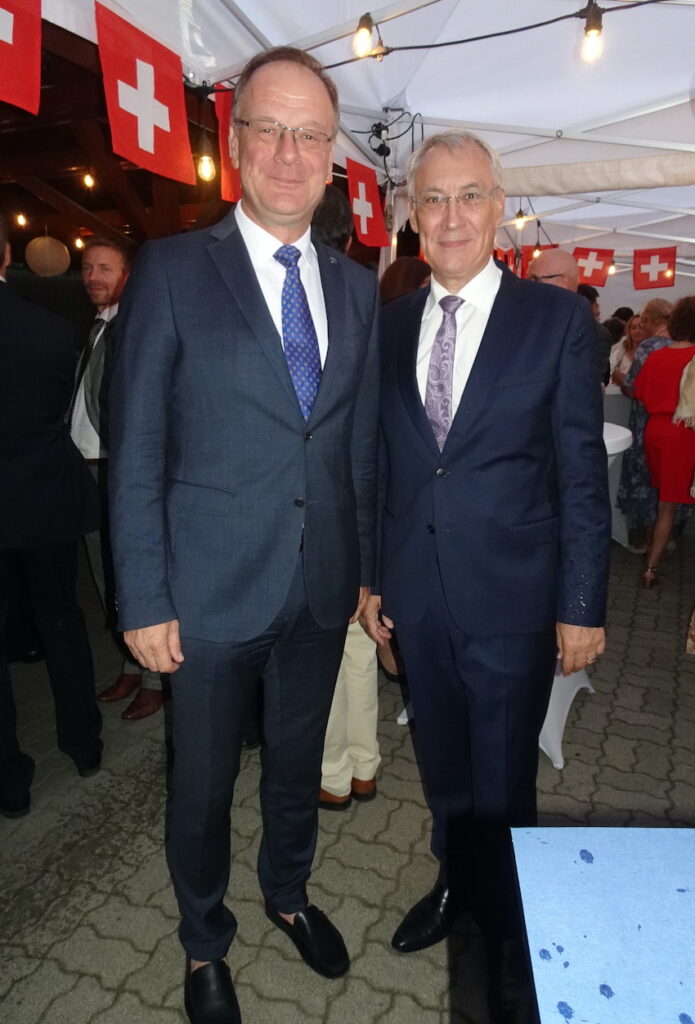
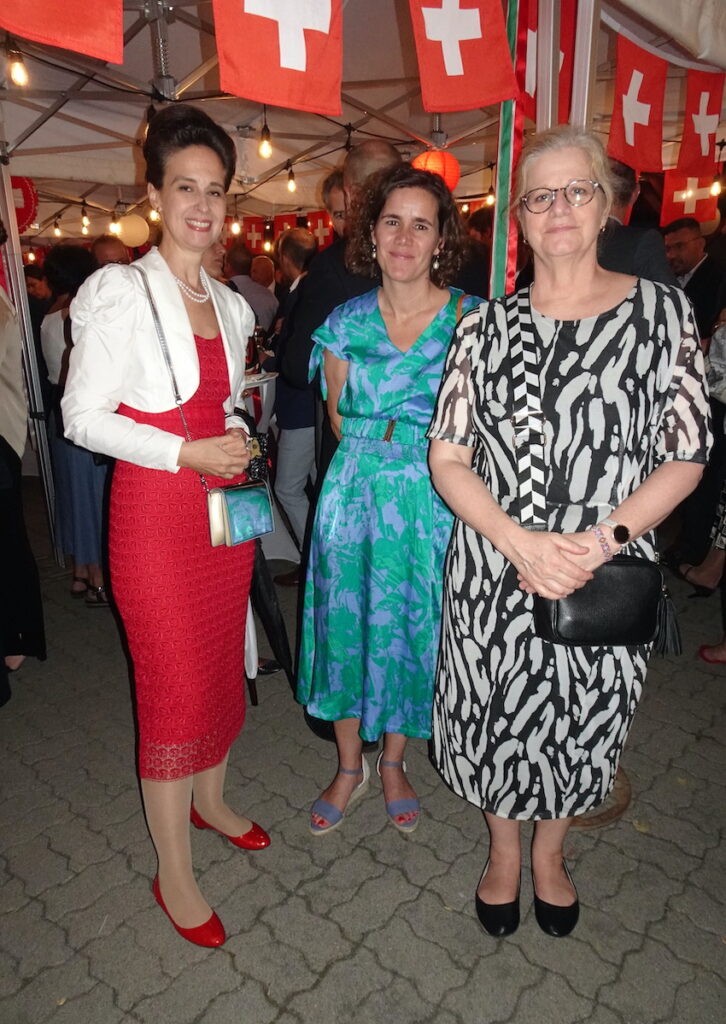
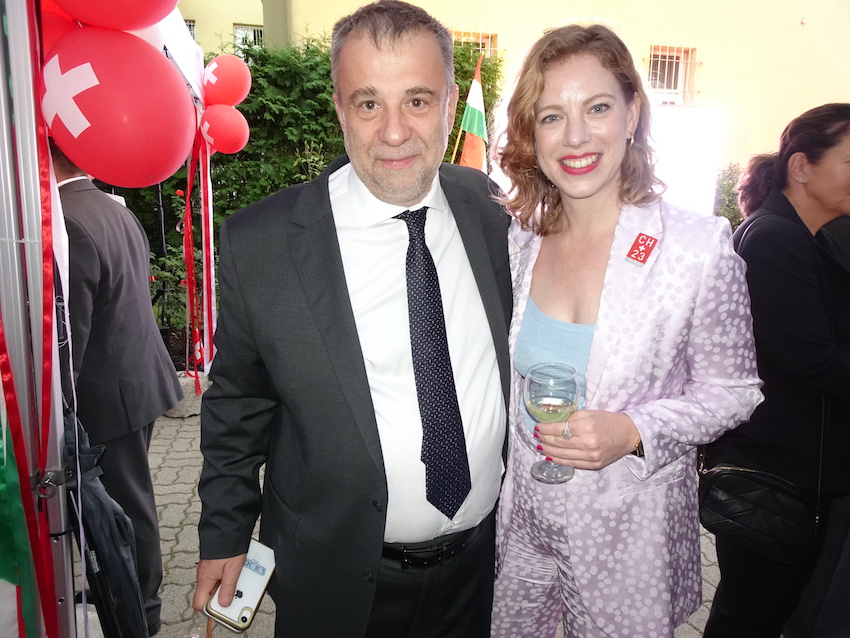


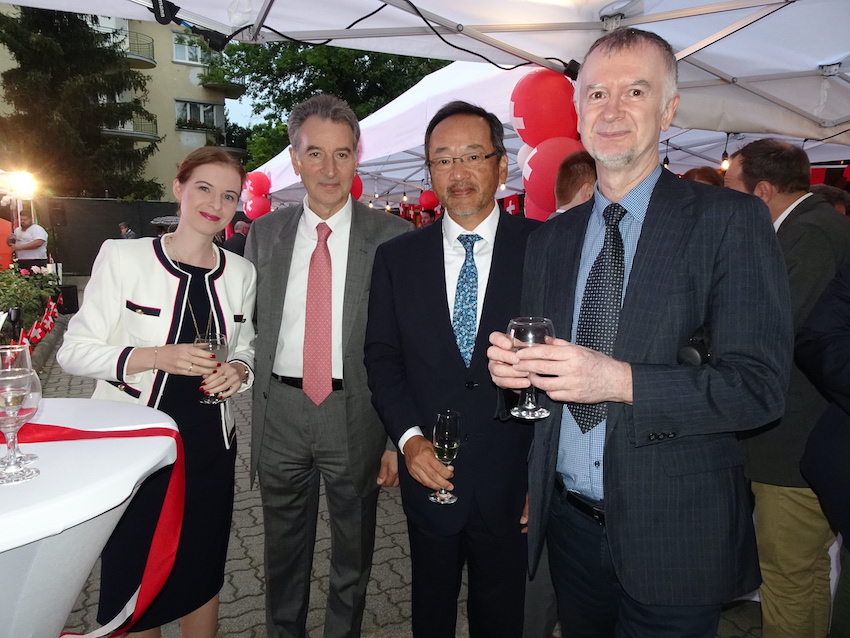

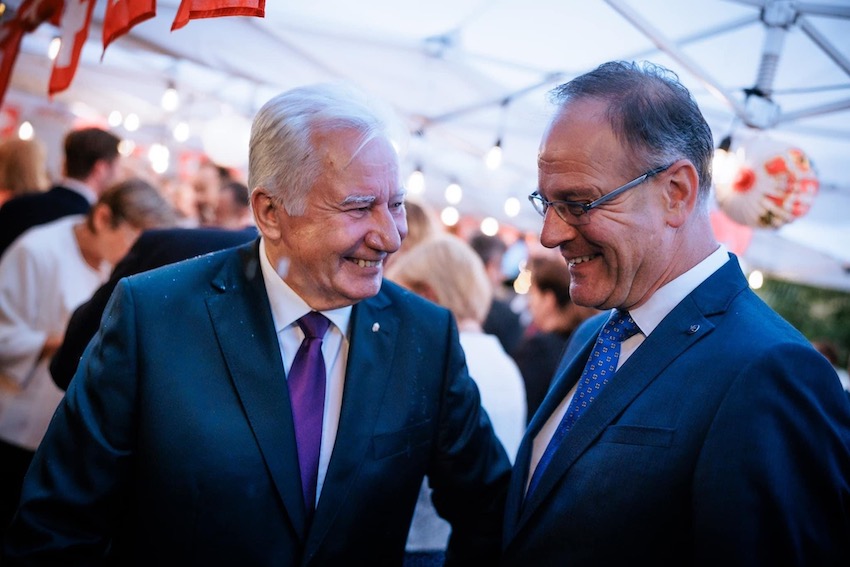
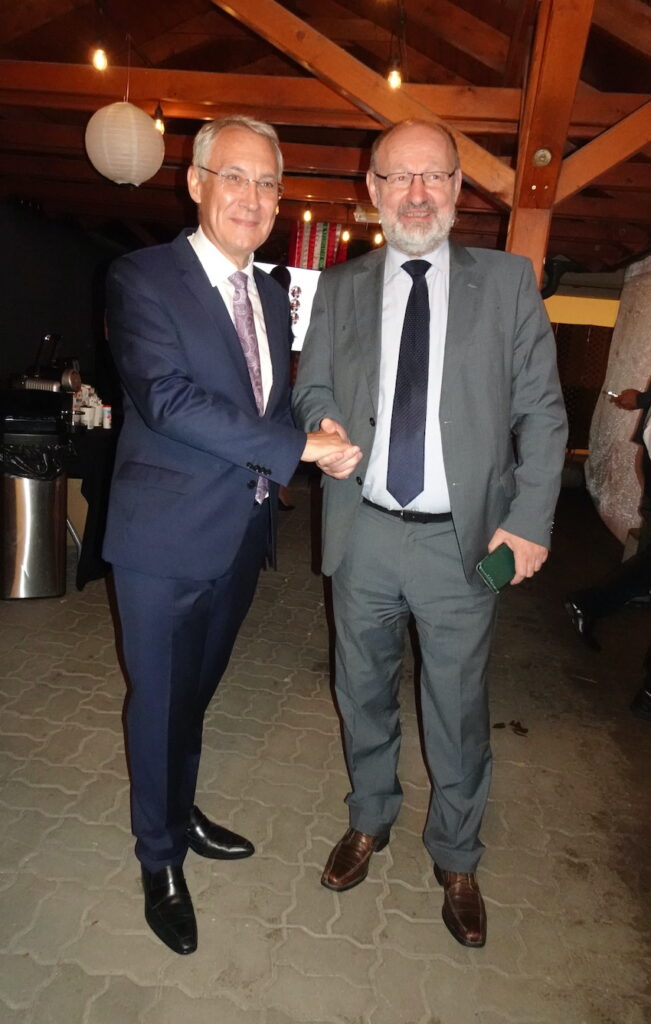
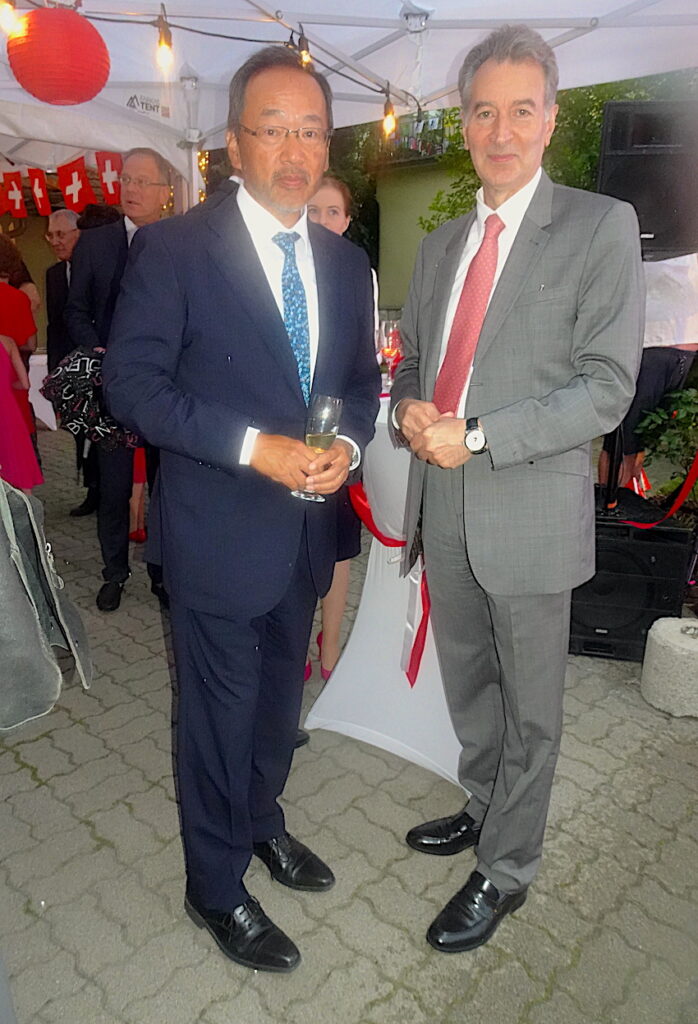

The solemn evening started with the national anthems of Switzerland, Hungary and the European Union, performed by 45 young musicians from Bern, all dressed in red. A giant alphorn, Switzerland’s national symbol, also accompanied the performance. The alphorn is a traditional wind instrument that has been used by Alpine farmers for centuries. Known for its distinctive and resonant sound, it holds significant cultural and historical importance in Switzerland.

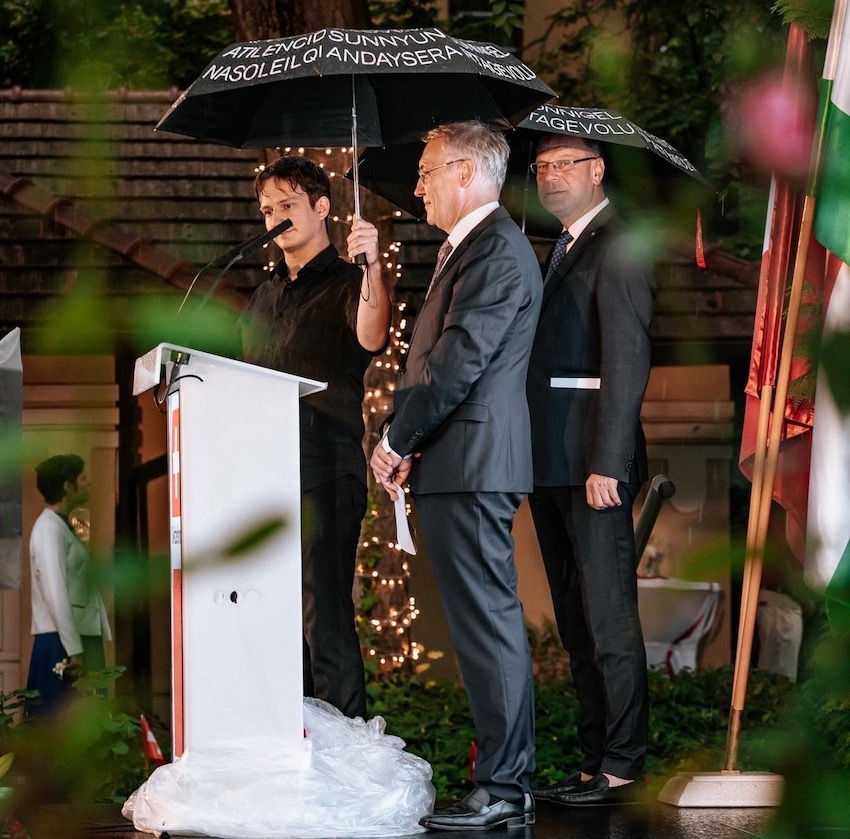


Ambassador Paroz welcomed the attendees and the Guest of Honour, and delivered his opening remarks dedicated to the anniversary:
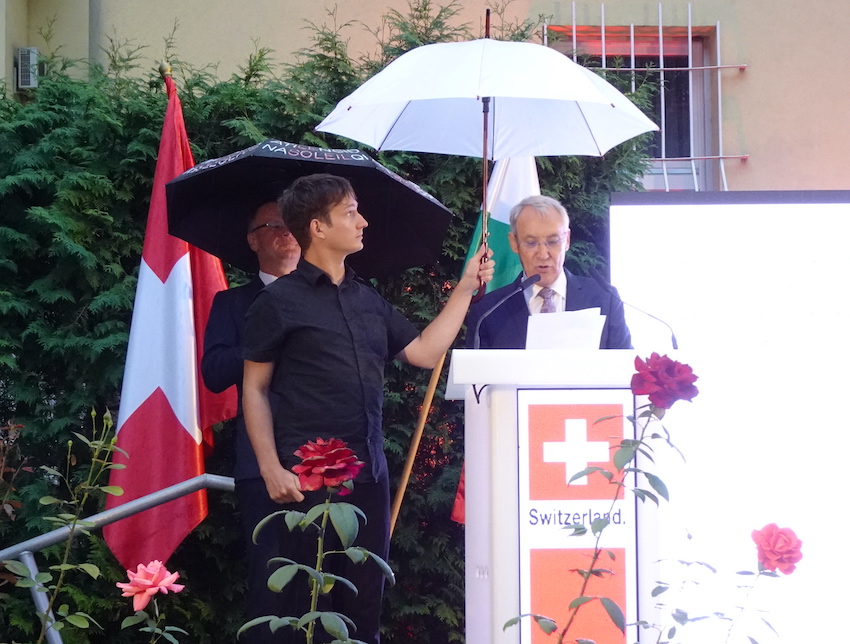
“Dear Guests, together with my wife Yulia, I welcome you wholeheartedly to celebrate the 732ndanniversary of the Swiss Confederation. We thank you for your presence and are also pleased to welcome our guest of honour, H.E. Dr. Tibor Navracsics, Minister for Regional Development and the utilization of EU Funds.
Let us first listen to the national anthems of Switzerland, Hungary, and the European Union. They will be performed by 45 musicians of the Youth Wind Orchestra KMB of Bern. The Orchestra starts a musical tour of Hungary. They are a symbol of the strong people-to-people bilateral relations between Switzerland and Hungary. Thank you, dear musicians, for your musical performance.
Dear guests, in Switzerland we cannot praise the efforts of our ancestors for having built the biggest, most powerful or most influential country in the world. But we certainly agree that the experience, started in 1291, has enabled us to achieve significant success, politically, economically and socially.
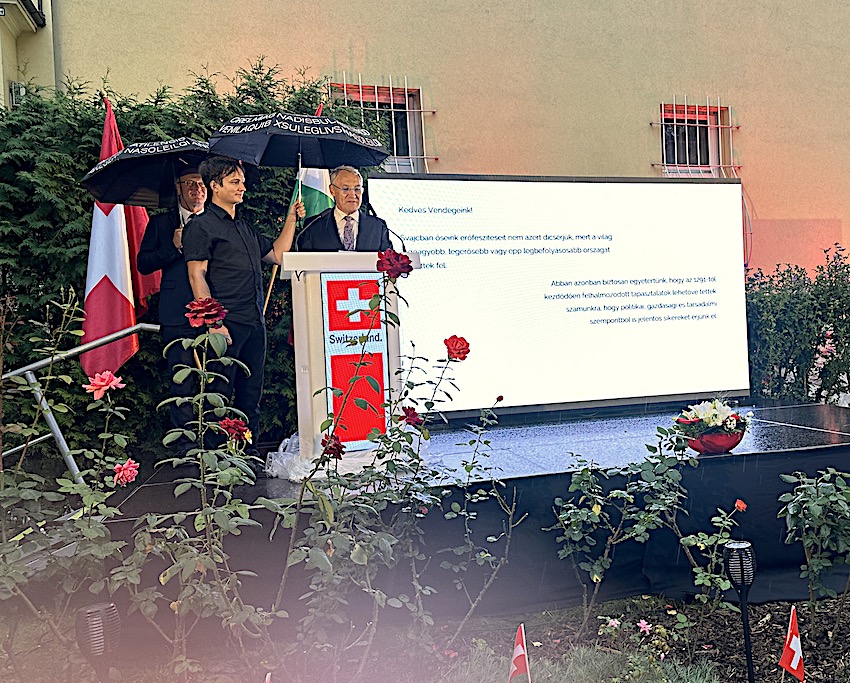
We are proud of our political stability, which is not built on the dominance of one party over the others, but on the permanent competition of ideas and political programs and on democratic choices.Our political system, with collegial government and permanent sharing of power between the main political parties, guarantees the impartiality of the State. A basic responsibility of the State is to protect every citizen, and pluralism is enshrined in the political system. Federalism also contributes to respect for minorities and inclusiveness.
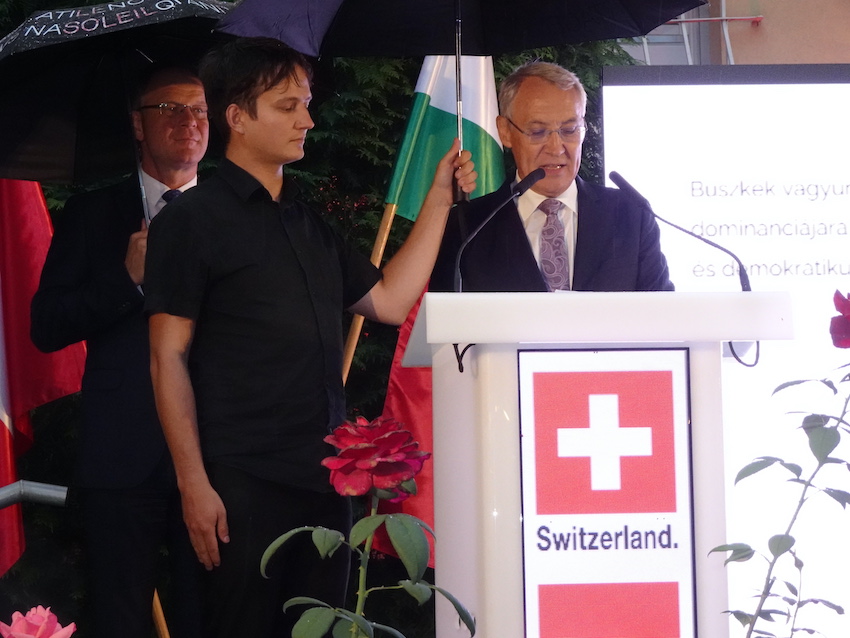
In our direct democracy system, citizens make informed decisions as the result of electoral campaigns with equal access to the media. The laws are adopted after lengthy consultation processes, in which key stakeholders have the occasion to express their views.
The tradition of close cooperation between public authorities, private sector and research institutions contributes to the economic success of my country and to its impressive records in the field of innovation. In Switzerland, the main role of the State is to create framework conditions favourable for economic activities, and the authorities refrain from any nationalistic economic policy. A central recipe of Switzerland’s economic success is the fact that it is an open economy and an open society.
Migration is a hot topic in Switzerland, as it is in Hungary, in other European countries and around the world. It is a central campaign theme for next fall’s federal election and impacts our relationship with the European Union. In 2022, Switzerland had 8.8 million inhabitants compared to 6.8 million in 1990. 2.3 million of these 8.8 million are foreign nationals. More than 1.400.000 EU/EFTA citizens live in Switzerland, making up around 16.5% of the total Swiss population. Switzerland is thus one of the main contributors to the free circulation of persons (or freedom of establishment) in Europe.
Immigration entails important challenges, but it is before all a ransom of success. The attractiveness and needs of the Swiss economy are the main reasons for immigration to the country. This is also true, altogether, for Europe at large.
Mr. Minister, dear guests,
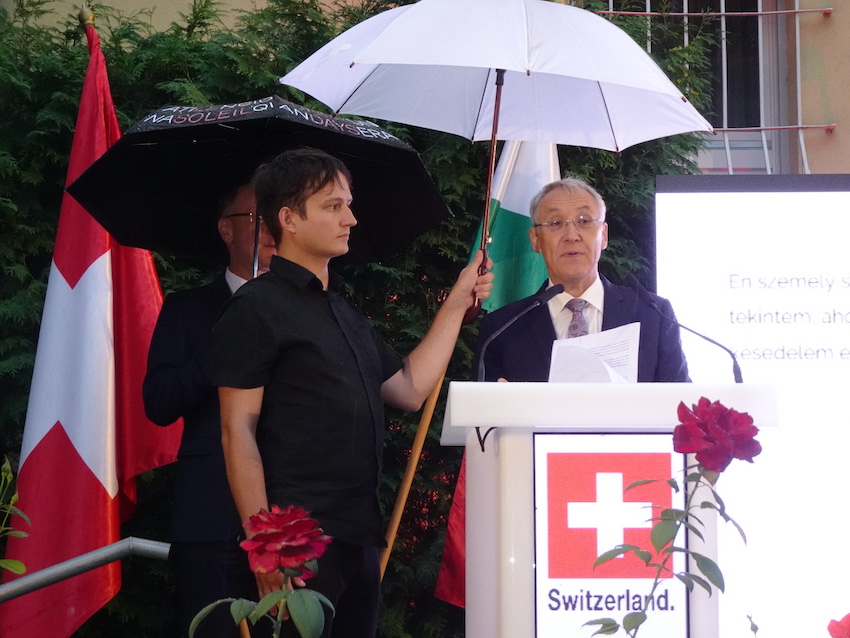
Nowadays, the success of the European integration process is of paramount importance for both Switzerland and Hungary. As a small country in the geographic centre of Europe, it is a unique chance in history for Switzerland to have the European Union as its single neighbour, as its main economic partner and as a world power sharing its political, cultural and societal values. The bilateral agreements between my country and the EU have resulted in a win-win situation. We must ensure the continuation of these relations enabling an appropriate balance of interests. In the case of Hungary, for the first time in its history, the country has the opportunity to contribute as a full-fledged member to a unique political and economic experience. Hungary is bringing and can bring many positive contributions to European integration and has all the necessary resources to do so. I personally see Hungary’s European integration as a success story, as is the European project so far. Yes, despite all the difficulties, delays and mutual frustrations, Europe is a success story. The free flow of goods and the free movement of people contribute to prosperity and freedom. Eastern European cars and trucks are increasingly visible on Hungarian and Swiss highways and two weeks ago, in Croatia, I was impressed that beside Austrian, German and Italian cars, we also saw Hungarian, Czech, Slovak, Polish and Romanian car plates in increasing numbers.

Dear guests, today in Europe, at a time when a war of aggression is raging in a neighbouring country, the European countries, EU member states and partners like Switzerland, are engaged in an effort to promote peace, harmonious co-existence of peoples, and prosperity on the continent. Switzerland is committed to bringing its contribution to this collective effort.
Mr. Minister, last November we both signed the Framework Agreement for the Second Swiss Hungarian Cooperation Program for the reduction of economic and social disparities in Europe. The first annual meeting of the Second Swiss Contribution to Hungary was held in Budapest in May this year. The Swiss and Hungarian delegations discussed the progress of the program, transparency and civil society participation. This very evening we just signed the support measure agreement for the Andrássy University research project with Deputy State Secretary Gergely Vartus. It will foster research in thematic areas that are of great importance for both countries: 1) Strategic Challenges for Small and Middle-sized States; 2) Democratic Innovations; 3) European Perspectives for the Western Balkans. It is the first project that we sign and thus constitutes another important step towards the implementation of our cooperation program. The Swiss Embassy and its Swiss Contribution Office, headed by Director Roland Python, collaborate closely with the National Coordination Unit of Hungary and I am grateful for the excellent cooperation.”
After concluding the speech, the Ambassador invited Minister Navracsics to reflect on developments in Europe and the bilateral relations between the two countries:

“Your Excellency Ambassador Paroz, Ladies and Gentlemen,
I am honoured to be here on this distinguished event of celebrating Switzerland’s National Day. First of all, I would like to express my gratitude to His Excellency for inviting me to this event, which gives me an excellent opportunity for greeting the Swiss-Hungarian Cooperation Programme as Minister of Regional Development.
One of my main priorities is reducing social disparities by promoting regional growth and economic convergence. This task is immensely complex, however the Swiss Fund plays a greatly important complementary role in it.
As I am standing in front of you at this moment, I recall with great pleasure the significant event of last November, when Hungary and Switzerland came together to sign the Framework Agreement for the second phase of the Swiss-Hungarian Cooperation Program. This agreement marked a milestone in our bilateral relations, opening new avenues for collaboration and mutual understanding. I am pleased to say that our partnership has yielded fruitful results since then.

Today, let us celebrate the long-standing friendship between Hungary and Switzerland, which is based on our shared values of democracy and cooperation.
Additionally, it is important for me personally to mention that I am filled with admiration for the Swiss perception of democracy, which has been a shining example of stability and efficiency. Switzerland’s commitment to the active participation of its citizens in decision-making processes is a testament to the strength of its democratic values.

Another aspect that has always fascinated me is Switzerland’s autonomy. The Swiss have demonstrated a remarkable ability to maintain their identity, culture and sovereignty throughout history. This persistent commitment to self-governance and independence is commendable and serves as a guiding light for nations around the globe, reminding us all of the importance of preserving our unique heritage while engaging with the world at large.
On this National Day, I extend my warmest congratulations to the people of Switzerland for their continued success and prosperity!
Thank you again, Mr. Ambassador for the invitation and thank you for gracing this evening with your presence.”
“Happy Swiss National Day!”

The rain didn’t cause any inconvenience to the guests and didn’t dampen their spirits, thanks to the excellent planning of the hosts, who provided large tents to shelter the invitees and ensured that everyone could relish the celebration without any weather-related disruptions.

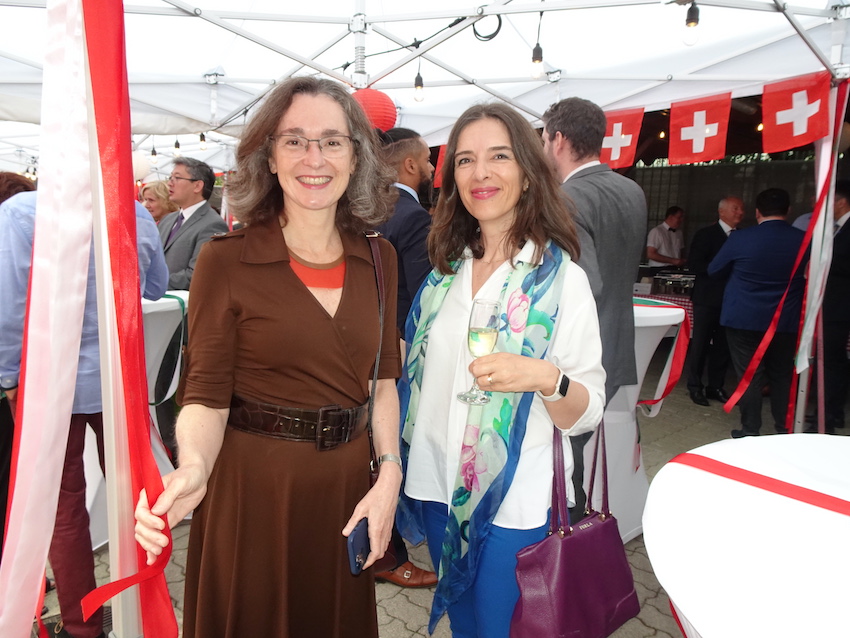
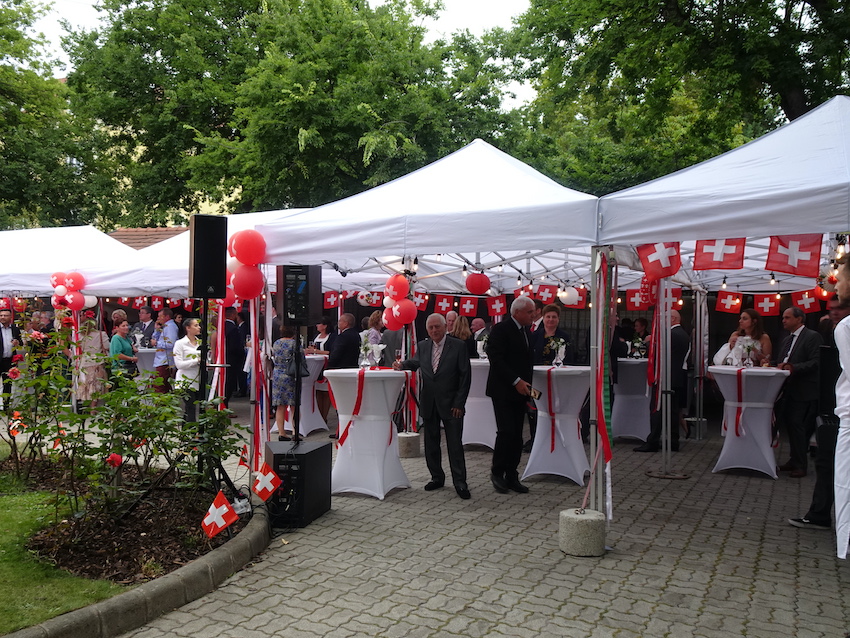
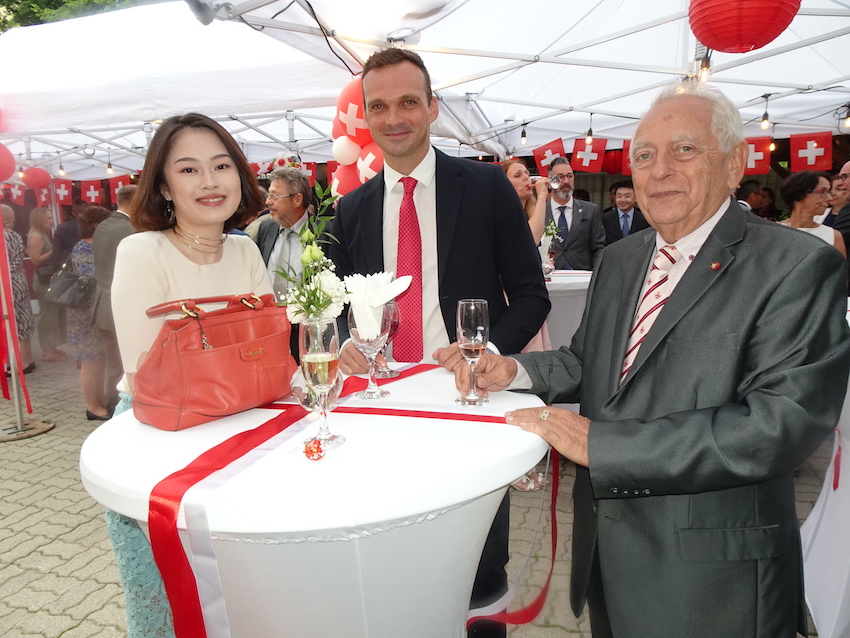

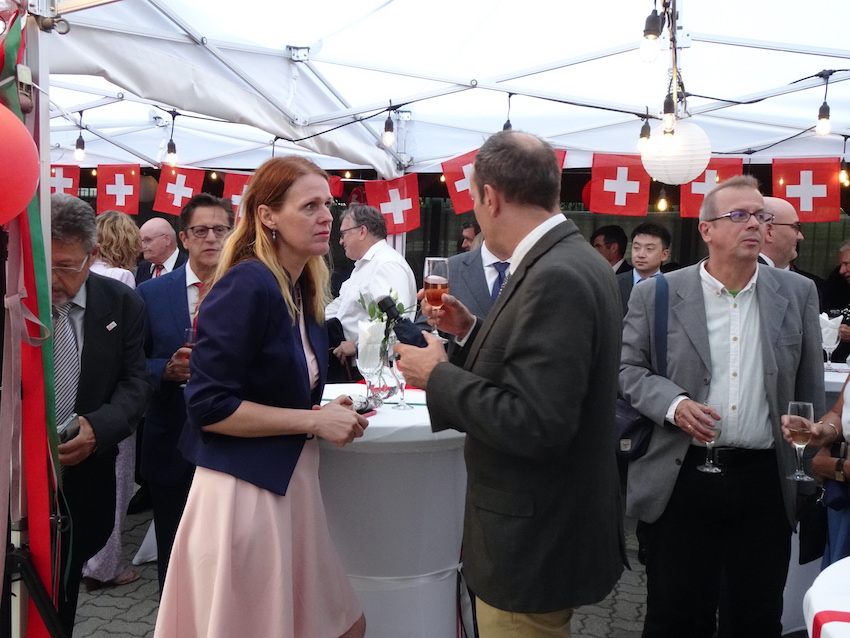
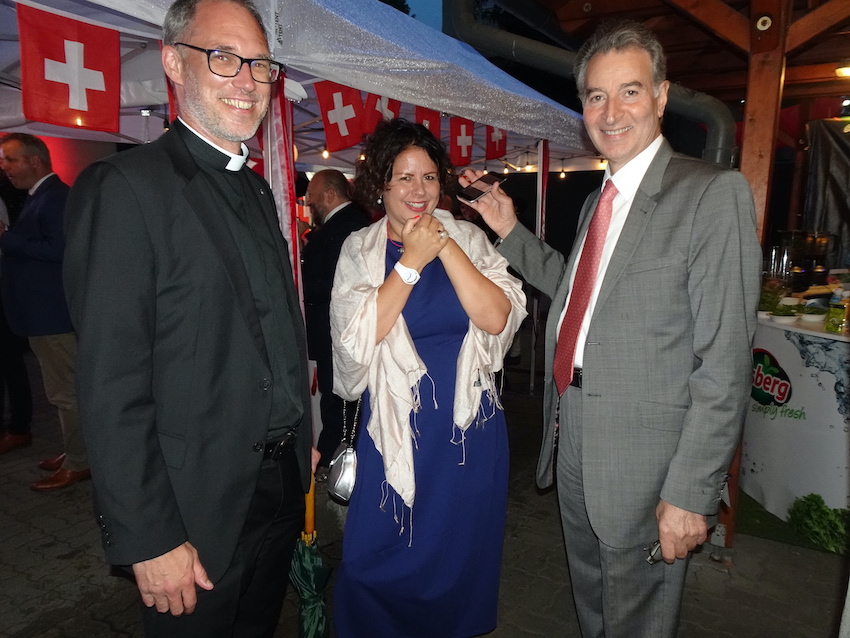
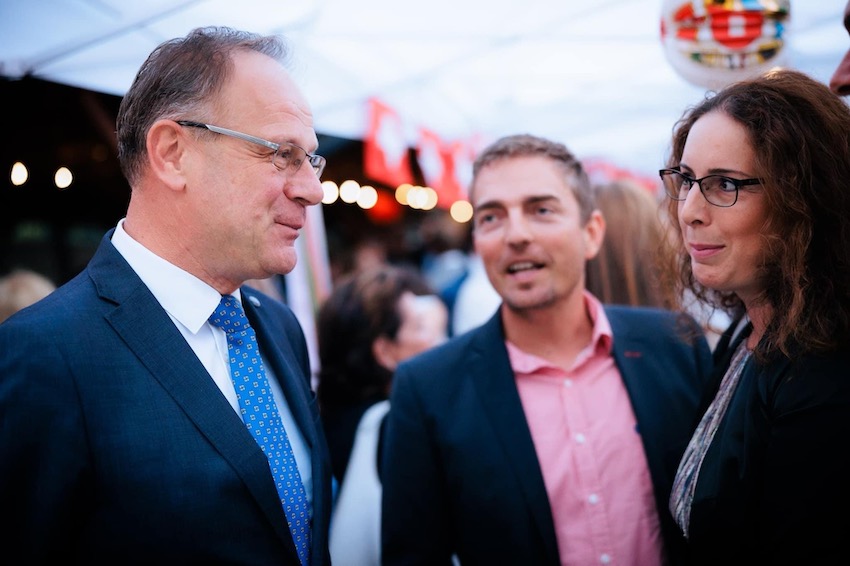
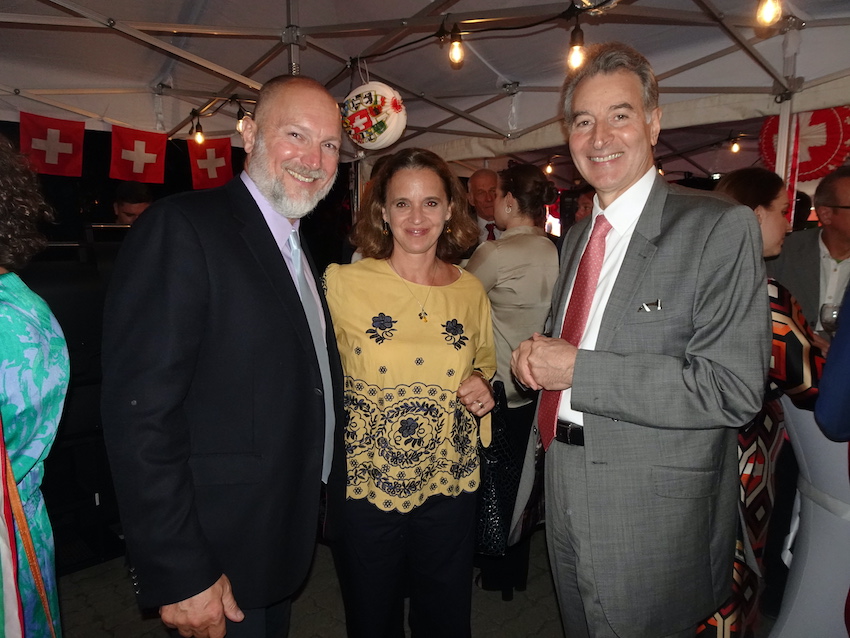

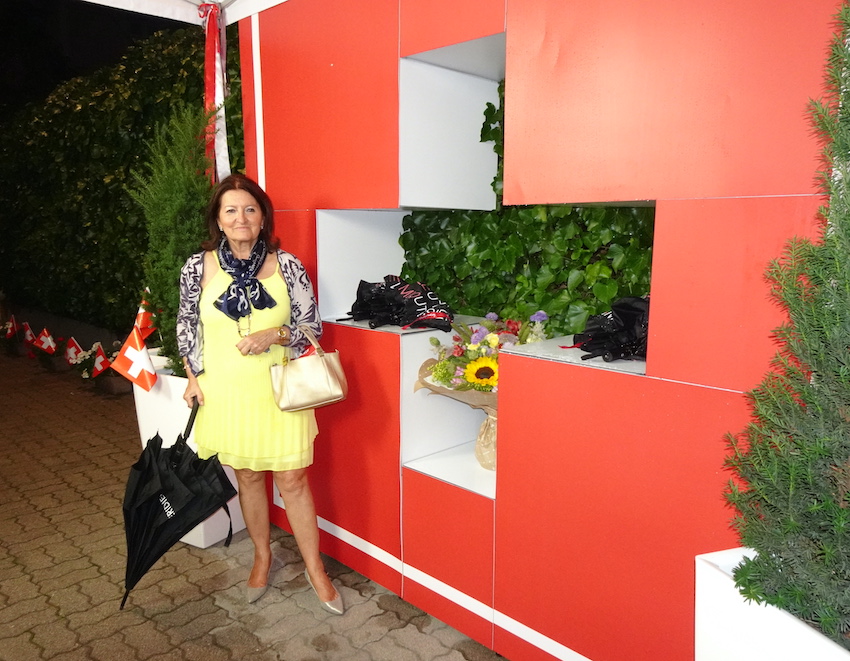
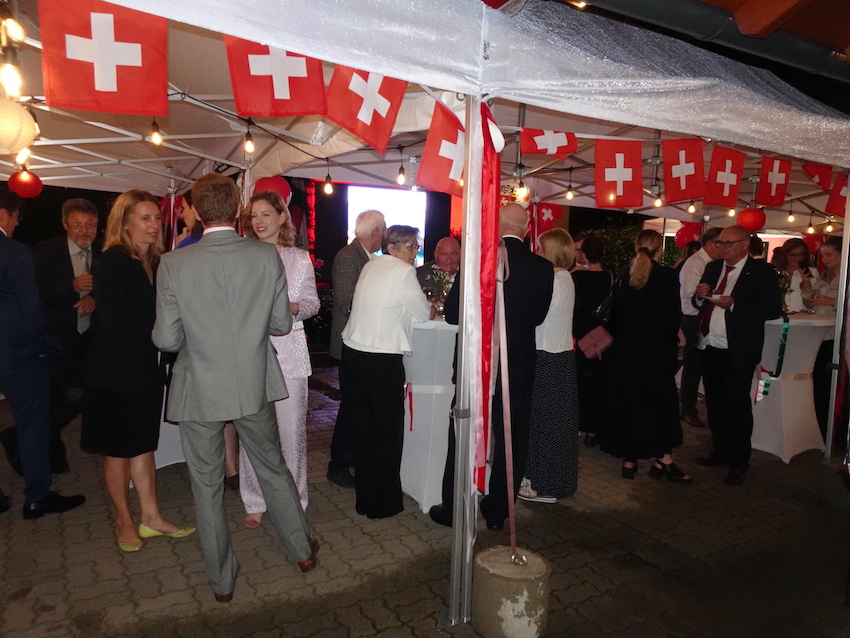
The guests enjoyed the generous hospitality, the friendly and relaxed ambience, the festive setting and the genuine Swiss specialities, including Raclette, cheese, braided bread and cervelat – the national sausage of Switzerland, as well as other delicious dishes and drinks that added to the overall enjoyment. And of course, no Swiss celebration would be complete without indulging in finest Swiss chocolate, which is also a must to pay culinary homage to the Confederation’s birthday and celebrate the essence of Swissness. With such attention to details by the hosts, the guests had a wonderful time, connected with others and cherished the evening.
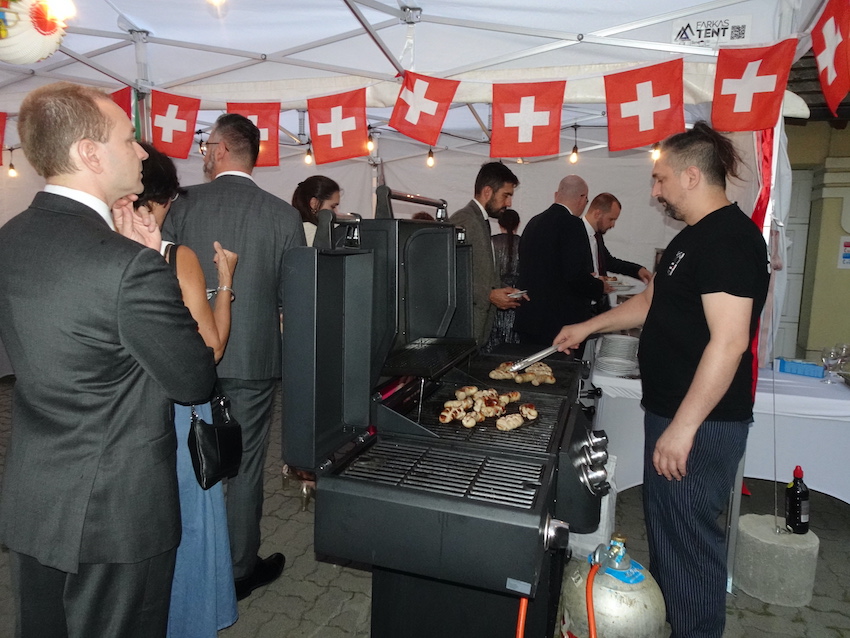
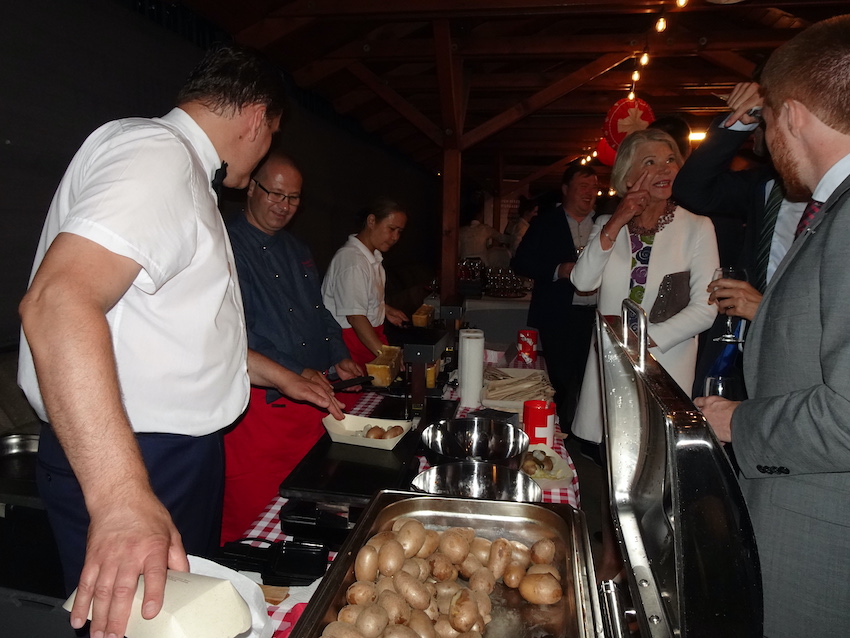

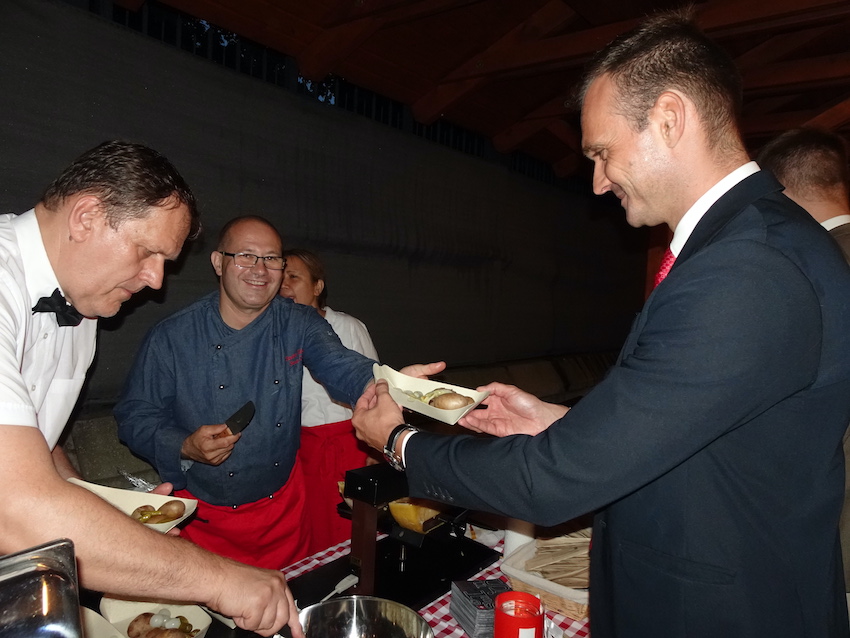
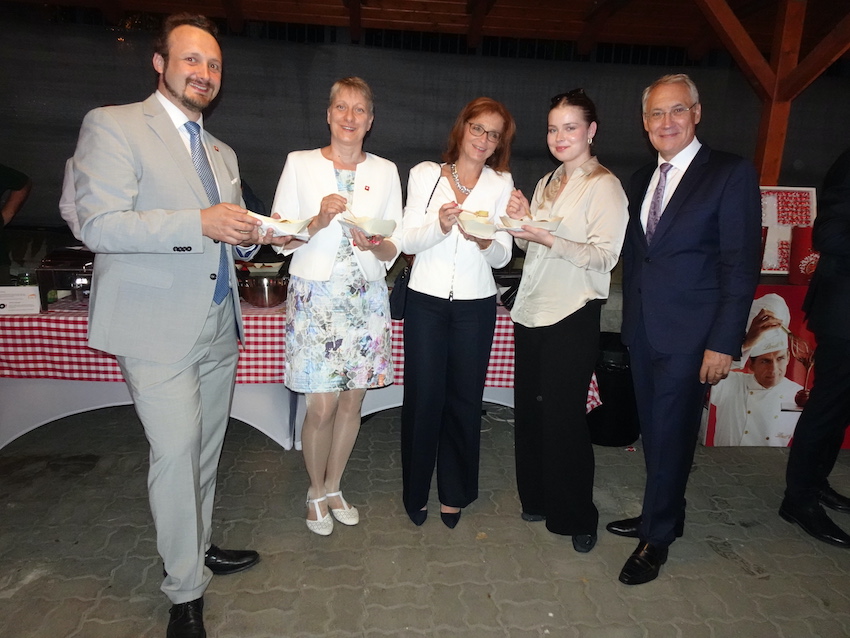



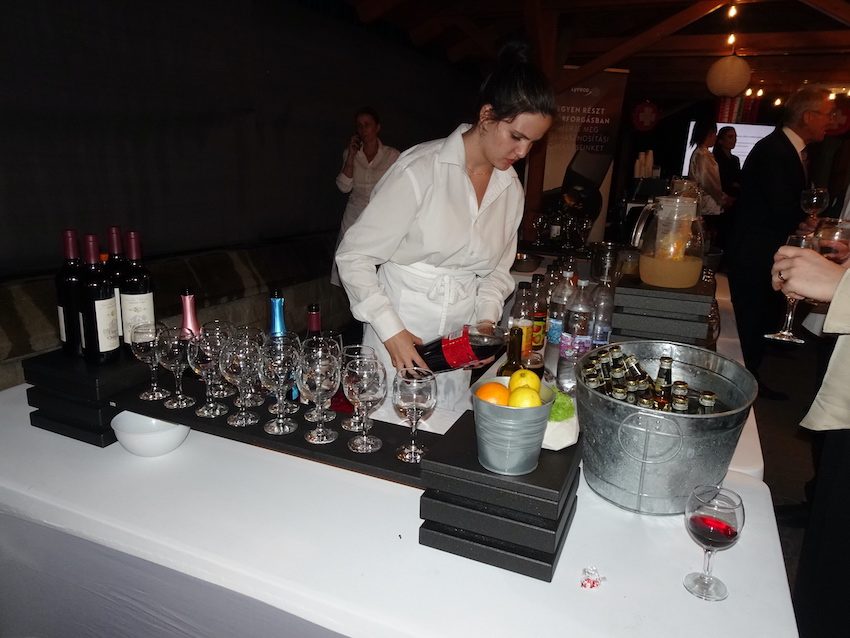

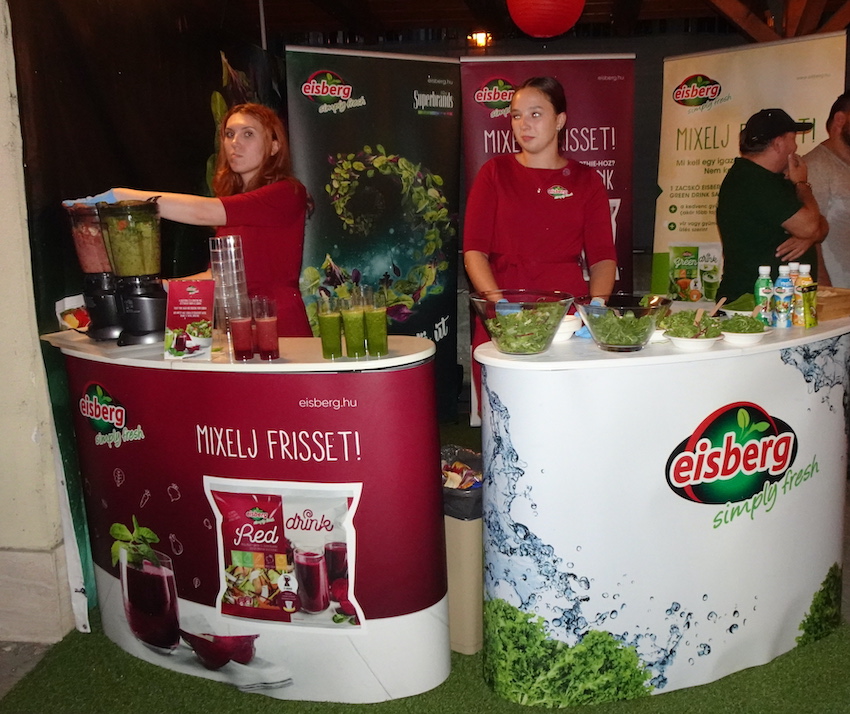
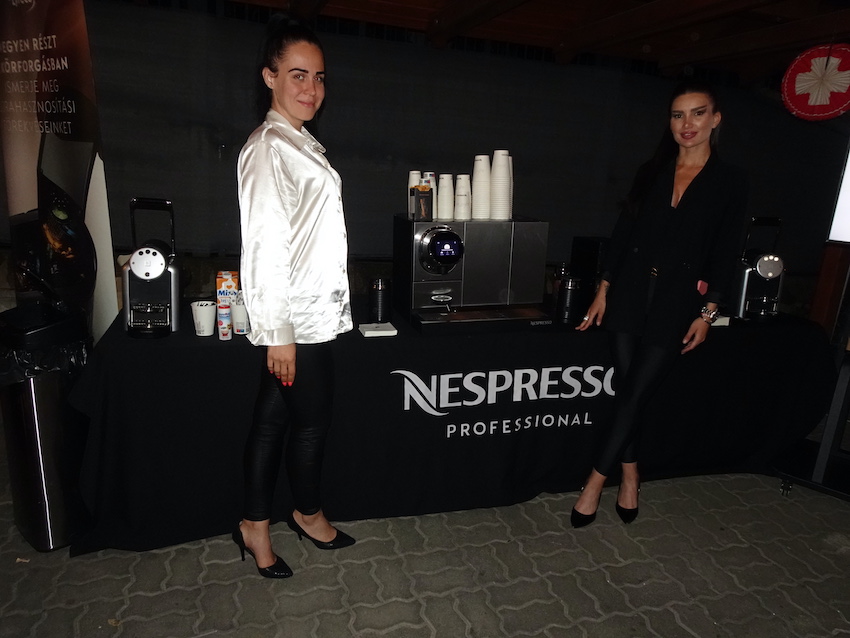
Source: Embassy of Switzerland in Budapest
Photos by Márk Széchenyi / Embassy of Switzerland and DPA





